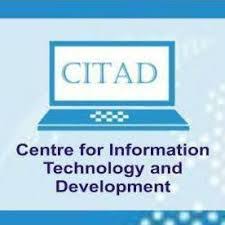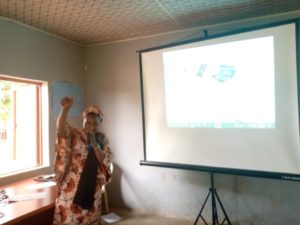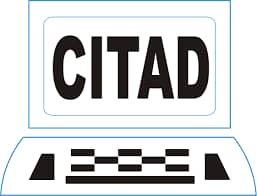
Rakiya A. Muhammad
For some hard-to-reach communities which lagged in ICTs, bridging the digital literacy divide means they can access critical information and digital media necessary to shape their day-to-day lives.
Internet access positively affects agricultural outcomes for women in some rural areas in the Federal Capital Territory, Abuja. It is boosting computer-based examinations for the students. The youths access information to help improve their knowledge, attend online events, apply for internship programmes, and identify/create products and services.
Tunga Asheri is one of these rural areas leveraging on a digital literacy initiative to change their narratives. It now has a primary school for the first time in its decades-long existence.
“We posted a picture of where we were using for classes on Facebook, and it attracted the attention of UBEC, which built a school in the community,†Madaki Kashimu, the ICT facilitator in the area.
Kasimu is among the first batch of ICT trainees in Tunga Asheri, one of 15 benefitting communities of the ActionAid ICT for Development initiative, aiming to break the digital barriers between rural and urban dwellers.
Agricultural activities were her top priority; thus, she was reluctant to give some of her time to a programme that she felt was not worthwhile. Though Hassana gave it a lukewarm reception, many other Leleyi Gwari inhabitants say they were excited about the scheme.
URBAN-RURAL GAP
The urban-rural gap remains an issue of concern in Nigeria, with several rural communities disadvantaged in the era of digital transformation and creating a considerable hindrance to their success and future.
“Large swathes of the rural landscape are still not covered by mobile broadband networks, and fewer households in these areas have access to the Internet. Also worrying, the rollout of communications infrastructure is slowing. Since growth in communications infrastructure deployment was already showing signs of slowing in 2019.â€
“In Africa, only 28 per cent of households in urban areas had access to the Internet at home, but that was still 4.5 times as high as the percentage in rural areas, which stood at 6.3 per cent.†The Nigeria Digital Economic Report of the World Bank Group provides an insight into the situation in the country:
In Africa, only 28 percent of households in urban areas had access to the internet at home but that was still 4:5 times as high as the percentage in rural areas, which stood at 6.3 percent- ITU
BRIDGING DIGITAL BARRIER IN FCT RURAL COMMUNITIES
ActionAid’s ICT for Development initiative aims to bridge the digital barrier between those living in hard-to-reach communities, worked with 15 communities across five area councils Kuje, AMAC, Bwari, Kwali and Abuja FCT.
Hajara Adamu, the ActionAid Nigeria Advisor, Partnership and Local Rights programme, explains what informed the scheme. “We noticed that over some time now in most of our communities, access to ICT is a challenge, that prompted ActionAid to start the pilot ICT for Development,†she reveals.
“We introduced the programme after interacting with the community and coming up with a need assessment of what they want as a community and aligning it with the SDGs that said we should leave no one behind in terms of development.â€
Each area council has a centre in a community where other benefitting communities within that area council go for training. In Kwali local government, Leleyi-Gwari is the centre that serves Lele-Basa, Piye, Kilakwa localities.
“We did the need assessment in early 2017 and equipping the ICT centres in the 4th quarter of 2017. The training started properly in 2018,†Hajara discloses.
Part of the aim was to make the ICT as simplified as possible for the low literacy level.
22-year-old Aisha Mohammed Sarki, a Leleyi-Gwari Local Education Authority (LEA) Community primary school teacher, is a beneficiary. After the training, she introduced computer science in the school to impart the knowledge to the community’s younger generation.
“We are thankful for ActionAid/CITAD gesture. The ICT has helped us a lot, especially me. I didn’t have the knowledge, but I am now teaching the pupils computer science with the skills,†an elated Aisha declares.
“Before now, I did not know it is possible to plant rice in any area apart from Fadama (a land capable of being irrigated); I didn’t know there were rice varieties you could plant anywhere. I discovered that through the computer,†Hassana states.
Shuaibu
Another beneficiary of the ICT initiative, 23-year-old Kauna Lasisi, a groundnut farmer, says she mostly does research online with the new skill. “Before the computer training, I did not know that if I need something, I could google and place an order,†she says.
“I was looking for a variety of groundnut. We searched the variety online and got it. I sowed it. Right now, it is still growing.†Yusuf Shuaibu, Manager/Facilitator of the ICT centre, who was among the first batch of ICT trainees in Leleyi-Gwari, describes the programme as excellent.
“It has touched a lot of lives in the community, especially mine. I didn’t know how to use a computer. It was CITAD who taught me how to use a computer. I can do very well now. I can do a lot,†reveals Shuaibu , 2017 graduate of Niger State College of Education, who grabbed the ICT opportunity as it came.
“In the second batch, some of them wrote WAEC. I took them through the process of computer use, something that internet cafes were charging exorbitantly. The cafes charged about N15,000.†He expresses joy “the ICT beneficiaries are engaging in marketing.
Some created google accounts for JAMB and personal use; some have Facebook pages. They share their community problems for anyone who cares to help and even for government.â€
“Also, they use it to report cases as the communities are remote and lack access to the police station; some developed businesses because it was not just about digital or computer training alone, but capacity building on entrepreneurship development.â€
He adds that online business transactions now occur among neighbouring communities that were part of the ICT training. However, the facilitator laments that during the rainy season, they record low ICT use.
“Wet season impact on it because farming is the major source of income for the communities. A father would not allow his son, after returning from school, to come to the centre; he instructs him to go to the farm,†he reveals.
On how they are sustaining the centre, he explains: “ActionAid /CITAD advised we develop a business that can generate some money to keep the place running. But here, we do not have one of the most important things-a photocopying machine and printer is not working.â€
“What I do is to fuel generator with my money, not that the community is paying me, it was ActionAid that was paying me before along the line after a year plus, they said the community would take over but who is here in the community to pay me? Nobody, I make the sacrifice since they are my people.â€
He lauds ActionAid/CITAD for the efforts in their community. “Even for the third batch, they provided transport fare for those people coming from other communities. They also made fuel provision and data for the ICT training,†Shuaibu discloses.
The traditional head of the community, Sarki Yusuf Giya, remarks: “The computer has helped us a lot; many children know how to operate the computer now.†He observes that, with the ICT, the community recorded a lower failure rate at WAEC and JAMB examination.
“Hitherto, they didn’t know ICT, so they fail because they would know the answer but do not know how to operate it, but with the coming of ICT centre, none of them is facing that.â€
Sarki also recalls: “Before now, when they go out to the internet café, they spend more than N2,000 for transportation, browsing, and researching, but now with N200 data they can browse.â€
Teacher, Aisha
CONNECTIVITY, ELECTRICITY CHALLENGES
“We noticed that almost all the communities do not have strong networks. So, it has been in our plan to pay advocacy to the service providers- the ones that are available in those communities.â€
She also comments on the electricity problem and sustainability challenges, especially in area councils with no electricity supply. “Most of these communities do not have access to power supply, which means we have to run on a generator.
Our initial plan was to install the solar system. Between the time of budget and purchase, there was a substantial difference, so the allotted amount could not cover for the installation of the solar system,†the Advisor reveals.
“We believe if there has been a solar system and people can go there without needing to buy fuel at all times, that would have improved in terms of participation and other outcomes that we would have been having in the project.â€
She, however, points out that the communities should be able to use the ICT programme for their growth. “This is something that they normally go out to spend transportation to go to the nearest town to print, photocopy, register, etc. It is in their communities now, they should properly use it, and they should be able to sustain it.â€
According to her, from their assessment, the outcomes are not the same across the five centres. “Some centres are excelling more than others, and currently, ActionAid is looking for other collaborators because the project is just like a pilot, as a model to the government on how little it would take to bring development to the hard-to-reach communities.â€
She expresses happiness they have been able to make some impact in the communities. “We are happy when projects start if we can make an impact in the life of one, that person can bring a ripple effect.
In one community, Tunga Asheri, there had never been a primary school for all its existence, but the ICT programme drew the attention of UBEC. Now the community has a school,†the Advisor asserts.
“This is what we have been urging through advocacy, and it didn’t work. So, I would say we thank God for where we are, but with time, we would have more success.
ICT FOR DEVELOPMENT, GOOD GOVERNANCE
According to the Sponsorship Officer CITAD, Mubarak Ekute, the centre sees technology as a tool to promote sustainable development, good governance and peaceful coexistence.
He adds CITAD uses ICT to empower youth and women through access to information, skills and online mentoring opportunities. The primary aim of the Local Rights Programme (LRP) of CITAD with funding from ActionAid, Ekute explains, is to improve the socio-economic status of poor women, men and children in the rural communities.
He adds the programme focused on basic education, ICT For development, women’s rights, health, governance, and human security emergencies. Ekute harps on the need for government to complement the work they are doing in rural communities.
“Realising the full benefits of the digital economy requires Nigeria to focus on accelerating improvements in five fundamental pillars of the digital economy; digital infrastructure, platforms, financial services, entrepreneurship and skills,†says Shubham Chaudhuri, the World Bank Country Director for Nigeria.
“To ensure that the country is digitally enabled by 2030, investing in infrastructure to bridge the digital divide and creating an enabling regulatory environment for the digital economy to thrive is of paramount important.â€










